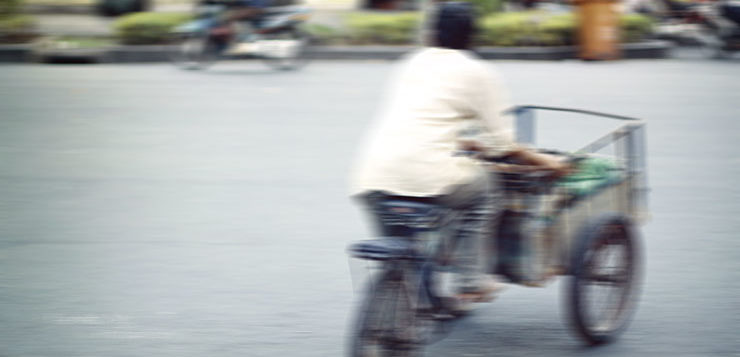DON’T MISS ANYTHING! ONE CLICK TO GET NEW MATILDA DELIVERED DIRECT TO YOUR INBOX, FREE!
Charity doesn’t always begin at home, and it can sometimes be a hand up over a hand out. Shira Sebban explains.
In March 2017, I began receiving calls from a Vietnamese number at odd hours, often in the middle of the night. Over the next four months, they continued, although I never managed to answer in time.
The fact they were from Vietnam was not surprising: I had been striving to help several struggling Vietnamese refugee and failed asylum seeker families since mid-2016. None of them, however, had ever tried to ring me. Unable to speak each other’s language, we tended to rely on interpreters or text messages pasted into Google Translate.
Eventually I managed to work out that my caller was a courageous 13-year-old called Quynh whose hard-working mother was oblivious to his attempts to reach me, while his father was suffering from a disability and no longer able to work. Such tenaciousness in someone so young was impressive: He was determined to seek help to alleviate his family’s plight.
Saddled with debts, the family had not been able to afford to keep Quynh and his older brother Quyen at school post Grade 3. Weighed down with responsibilities way beyond their years, both boys were expected to contribute to the household, which also includes their grandfather.
Now without the main breadwinner, they were really in trouble. Their mother works 12-14 hours a day, mostly washing dishes. Meantime, Quynh would walk the streets selling lottery tickets, while at 15, Quyen had become the man of the house, the only one who could do heavy work, including physically carrying his grandfather.
His wage – about $4 a day earned working in a café – was the only stable income on which his family could depend.
To ease their burden, along with that of others in similar straits, I had set up a crowdfund, Help Care for the Children, which would go on to raise $15,000.
Although managing to send their mother some money most months, her younger son serving as a constant reminder, we were still keen to find a more sustainable way to help the family long-term. The situation was rapidly becoming untenable, with Quynh having begun to message or call each month, borrowing a friend’s phone to beg for money, which, if no donations had been forthcoming, I would try to provide from my own pocket.
At the same time, his determination remained inspiring: We could not contemplate abandoning his family.
Ever since a friend had introduced me to KOTO (Know One, Teach One), the first registered non-profit social enterprise in Vietnam, I had been hoping the older brother Quyen might be an eligible candidate for the hospitality training it provides for at-risk and disadvantaged youth. But our attempts to reach KOTO founder and executive chairman, Jimmy Pham AM, had initially failed.
Jimmy had fled Vietnam as a child with his family, coming to Australia where he had later trained in tourism management. A chance meeting with street children during a work trip to Vietnam as a tour operator had led to his eventual establishment of KOTO in 2000.
Beginning with a small sandwich stall in Hanoi, the organisation had evolved to empower about 1,000 marginalised youth through vocational training, English language, interpersonal and life skills and stable employment as hospitality professionals. Armed with an Australian industry certificate, graduates go on to work in leadership roles in leading hotels and restaurants across Vietnam and overseas, some starting their own businesses.
As Jimmy has said, “To be successful means giving back. KOTO instils in the kids the idea of participatory community and asks in return that each of the KOTO trainees does the same. It really is asking ourselves, do we give someone a fish or do we teach them how to fish?”
In other words, we should assist those in need to stand on their own two feet, which would ultimately become the name of our subsequent crowd fund campaign in August 2018.
Some 12 months earlier, however, it was hard to see how we would ever reach that point. Our initial phone call to the family was met with a swift, albeit respectful, knockback. “He will have to leave home to study, and although the course is free, he won’t get a salary. He needs to be at home to look after the family and they need his income to survive.”
But we refused to give up: Why not try to raise enough funds to cover Quyen’s café wages? Predictably, securing the family’s agreement would prove a formidable challenge. Their father needed medical treatment and was still unable to work, and so understandably, his wife remained reluctant to let their older son leave home.
Nevertheless, by mid-2018, they had finally agreed to apply to KOTO, which recruits about 40 candidates, aged 16-22, every six months. Quynh too was keen to abandon selling lottery tickets in favour of carpentry training, and although we would have preferred him to return to school, we eventually agreed to include him in the fund-raising campaign.
Ultimately, donations exceeded our expectations, reaching over $12,000 in four weeks, notably thanks to the generosity of several members of the Australian Vietnamese community.
Their mother relayed her gratitude via our translator: “She and her family feel deeply indebted… She never dreamt her two children would have the opportunity to learn and have a proper career.”
At KOTO’s invitation and with our support, she accompanied Quyen to its Ho Chi Minh City office in September 2018 so he could sit basic literacy and mathematics tests. The organisation also visited the family’s home, checking his background and speaking with neighbours.
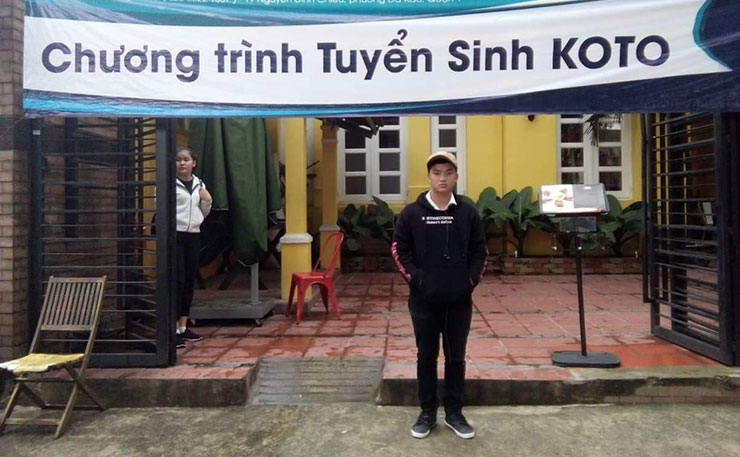
Having been told to return two weeks later for a final test and interview, we remained optimistic he would pass – even though only one in seven applicants gets through – and began making preparations for what we thought would be his imminent flight to Hanoi to embark on a month’s trial period, as per KOTO’s rigorous trainee recruitment process.
Little did we know how far we still were from a happy ending. Although not normally involved in the recruitment process, Jimmy kindly informed me of the outcome: Quyen had failed the interview round. Aged just 16, he was not mature enough as yet to leave his family.
“I love my mother so much,” Quyen wrote to me after I met him, together with his brother, mother and Jimmy at KOTO Saigon training restaurant during a brief visit in November 2018. “I have seen her becoming miserable, sacrificing so much for the family. I want to help her but I don’t know how.”
Nevertheless, KOTO was prepared to give him a second chance in six months’ time, so long as he agreed to undergo another interview in which he could demonstrate “commitment, perseverance and self-discipline”.
By May 2019, we had good news: After considerable mentoring, Quyen had been able to develop the required motivation to succeed. As the teenager embarked on the flight to Hanoi, Jimmy also asked me for “commitment that you won’t send him money for the two years no matter how tough it gets here so I can slowly move him away from this dependency he seems to have on you or any foreigner… Congratulations – you will see a very different empowered young man at the end.”
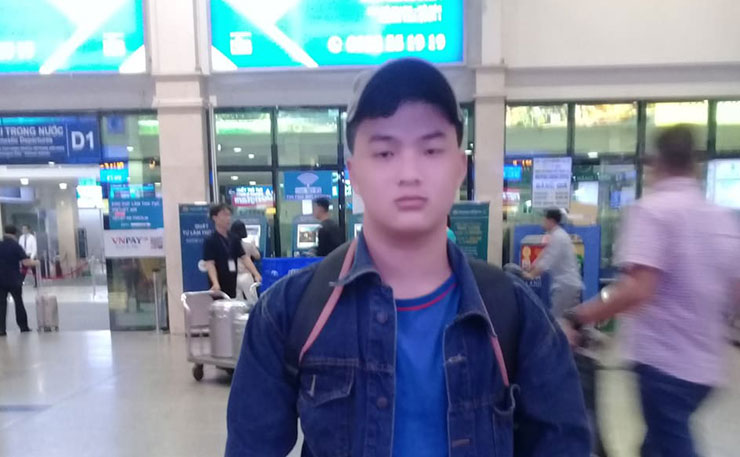
A few months into the course, Quyen is doing well. As he tells his friends, he is “learning how to listen” as well as how to cook. He occasionally messages me in his gradually improving English: “Thank you and the other benefactors for helping my family. I will try my best … Love you.”
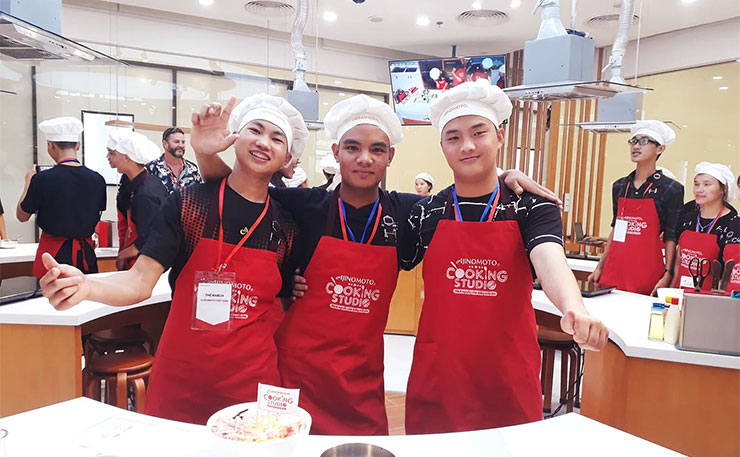
Jimmy wrote too, sending a photo: “He is settled and happy. Thought you should know.”
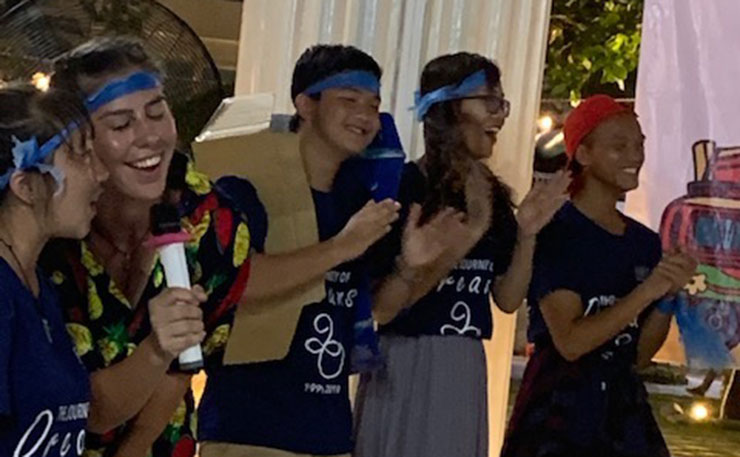
Time will tell if Quyen will realise his true potential, but I am already planning to attend his graduation ceremony in 2021.
After all, as Jimmy has said, “When you give someone love and empowerment, the future is limitless.”
BE PART OF THE SOLUTION: WE NEED YOUR HELP TO KEEP NEW MATILDA ALIVE. Click here to chip in through Paypal, or you can click here to access our GoFundMe campaign.
Donate To New Matilda
New Matilda is a small, independent media outlet. We survive through reader contributions, and never losing a lawsuit. If you got something from this article, giving something back helps us to continue speaking truth to power. Every little bit counts.

